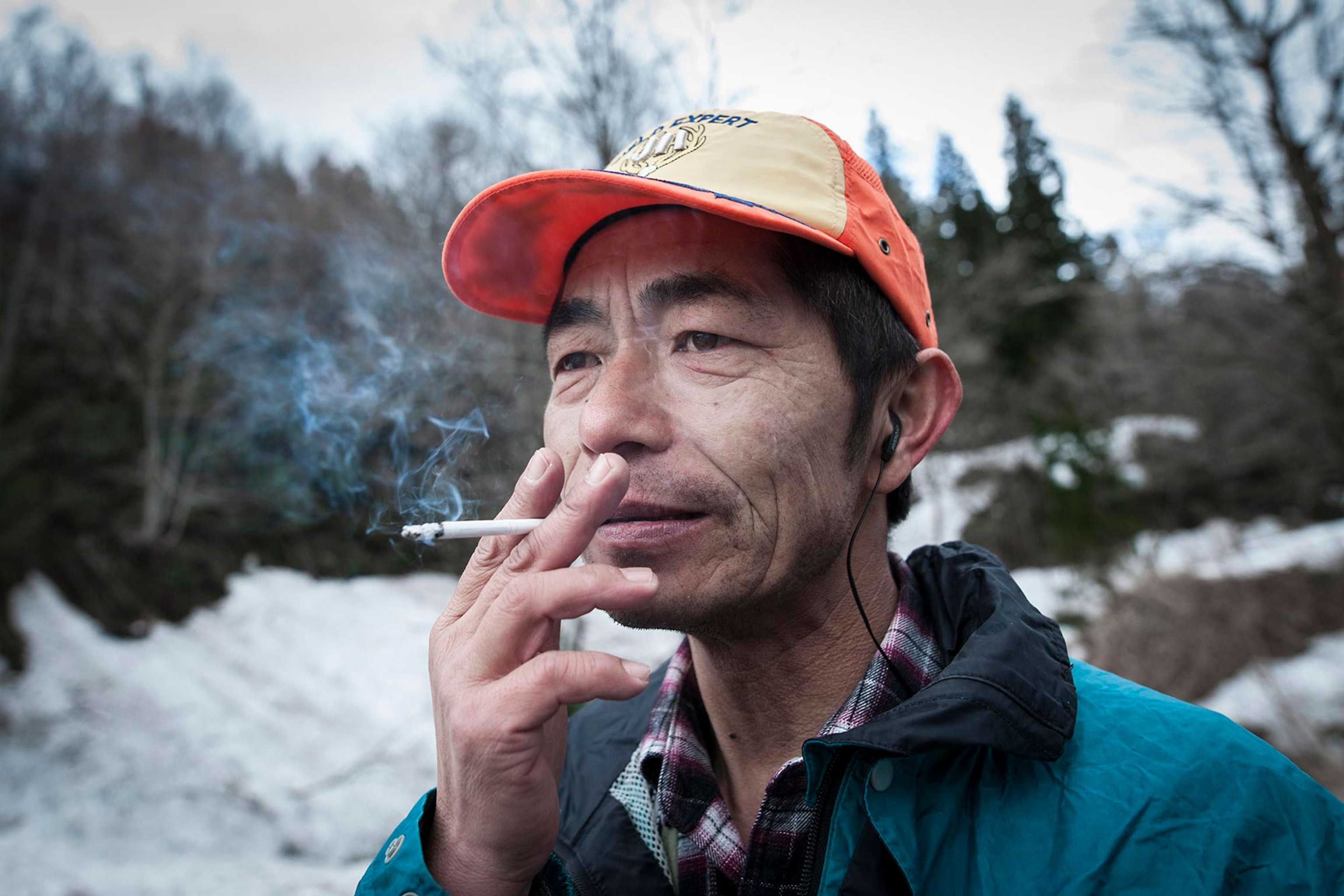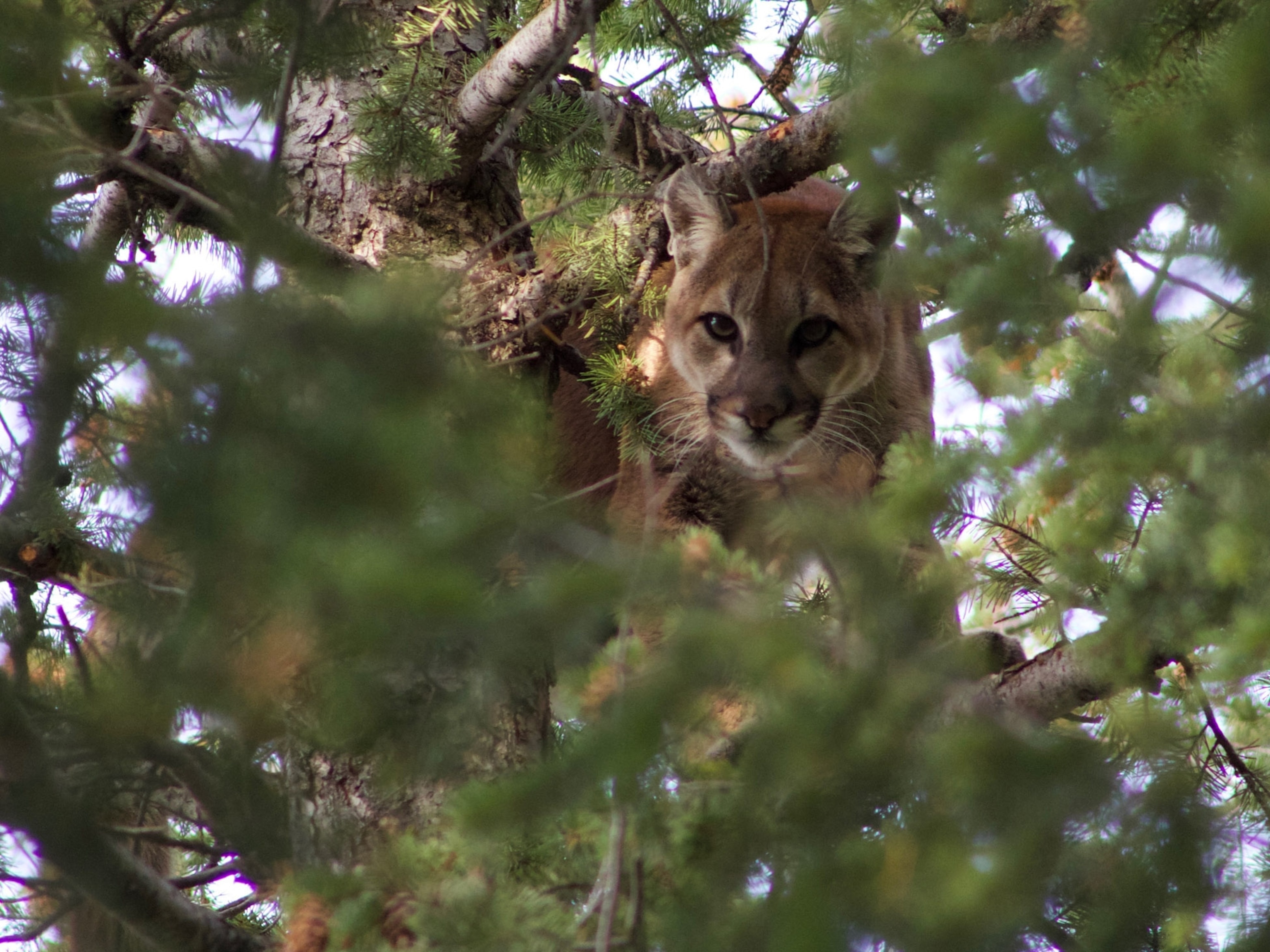
Japan's 400-Year-Old Bear Hunt Is Sacred—and Controversial
Photographer Javier Corso spent two weeks documenting the Matagi hunters, whose spiritual traditions are under threat.
Deep in the highlands of northern Honshu, Japan, the Matagi begin the winter hunt. They pray before entering the sacred realm of the mountain, then spend hours listening, waiting and watching; picking up on barely perceptible signs that the black bear is close.
The group of men splits up, with one group acting as watchmen, the other as decoys. Slowly, they close in before the marksman takes a shot. Red spots of blood flower in the virgin snow as the bear’s dead body is dragged to a nearby plain to be gutted and dismembered using a traditional Matagi knife. Part of the bear’s intestines are left as an offering to the mountain goddess.


The formality and spiritual precision of this act of killing sets it apart from the modern hunt. The Matagi are a community of hunters with origins dating back to the 16th century. Each settlement in northern Honshu has its own particular traits but all consider themselves special guardians of the natural balance. But since the Japanese black bear – their main prey - is considered a threatened species, the hunt is still met with controversy. (Read "Should We Kill Animals To Save Them?")
Javier Corso spent 15 days with the Matagi, taking photographs that illustrate how their practice was rooted in 400 years of history. Corso worked on the project as part of production company OAK stories, an agency of journalists, photographers and filmmakers focusing on local narratives. He worked alongside Alex Rodal, a chief research officer at OAK who carried out six months of research on the Matagi prior to the shoot.








“I wanted to show the origins of this community so people could understand what they do and why they do it,” Corso says. “I wanted to show the serenity of the hunt and their communication with the mountain.”
Alongside the visceral rawness of the killing, Corso’s portraits convey an identity that is deeply connected to the land and animals they hunt.
The hunt is such an intensely spiritual practice that Corso was the first to be allowed to document it, outside of Japanese photographer Yasuhiro Tanaka.
Corso and his team spent five days with one Matagi group, gaining their trust and learning about their culture, before they were invited to the mountain. “I was very impressed by the way they hunted,” says Corso. “It was very respectful.” Though they wear modern clothes, many hunt with the same weapons their ancestors used seven generations ago.
But their hunting has been severely curtailed in recent years. Following the nuclear disaster in Fukushima in 2011, the state banned many Matagi communities from marketing bear meat for six years due to fears of contamination. “They were forced to find other ways to sustain themselves,” says Corso.
In addition, there are many bureaucratic restrictions now surrounding the hunt. “It’s a very tedious and expensive process to get a license to hunt black bear, which you must renew every three years, even if you’re not directly involved in the actual killing” says Alex Rodal. “This puts the younger people off.”
Like many first nation communities, their cultural practice is under severe threat. “If some day the Japanese black bear does go extinct, the Matagi won't be the reason,” Rodal adds. “I think the Matagi will disappear before the bear does.”

Javier Corso is a member of OAK Stories. See more of his work on his website.
You May Also Like
Go Further
Animals
- Octopuses have a lot of secrets. Can you guess 8 of them?
- Animals
- Feature
Octopuses have a lot of secrets. Can you guess 8 of them? - This biologist and her rescue dog help protect bears in the AndesThis biologist and her rescue dog help protect bears in the Andes
- An octopus invited this writer into her tank—and her secret worldAn octopus invited this writer into her tank—and her secret world
- Peace-loving bonobos are more aggressive than we thoughtPeace-loving bonobos are more aggressive than we thought
Environment
- This ancient society tried to stop El Niño—with child sacrificeThis ancient society tried to stop El Niño—with child sacrifice
- U.S. plans to clean its drinking water. What does that mean?U.S. plans to clean its drinking water. What does that mean?
- Food systems: supporting the triangle of food security, Video Story
- Paid Content
Food systems: supporting the triangle of food security - Will we ever solve the mystery of the Mima mounds?Will we ever solve the mystery of the Mima mounds?
- Are synthetic diamonds really better for the planet?Are synthetic diamonds really better for the planet?
- This year's cherry blossom peak bloom was a warning signThis year's cherry blossom peak bloom was a warning sign
History & Culture
- Strange clues in a Maya temple reveal a fiery political dramaStrange clues in a Maya temple reveal a fiery political drama
- How technology is revealing secrets in these ancient scrollsHow technology is revealing secrets in these ancient scrolls
- Pilgrimages aren’t just spiritual anymore. They’re a workout.Pilgrimages aren’t just spiritual anymore. They’re a workout.
- This ancient society tried to stop El Niño—with child sacrificeThis ancient society tried to stop El Niño—with child sacrifice
- This ancient cure was just revived in a lab. Does it work?This ancient cure was just revived in a lab. Does it work?
- See how ancient Indigenous artists left their markSee how ancient Indigenous artists left their mark
Science
- Jupiter’s volcanic moon Io has been erupting for billions of yearsJupiter’s volcanic moon Io has been erupting for billions of years
- This 80-foot-long sea monster was the killer whale of its timeThis 80-foot-long sea monster was the killer whale of its time
- Every 80 years, this star appears in the sky—and it’s almost timeEvery 80 years, this star appears in the sky—and it’s almost time
- How do you create your own ‘Blue Zone’? Here are 6 tipsHow do you create your own ‘Blue Zone’? Here are 6 tips
- Why outdoor adventure is important for women as they ageWhy outdoor adventure is important for women as they age
Travel
- This royal city lies in the shadow of Kuala LumpurThis royal city lies in the shadow of Kuala Lumpur
- This author tells the story of crypto-trading Mongolian nomadsThis author tells the story of crypto-trading Mongolian nomads
- Slow-roasted meats and fluffy dumplings in the Czech capitalSlow-roasted meats and fluffy dumplings in the Czech capital




